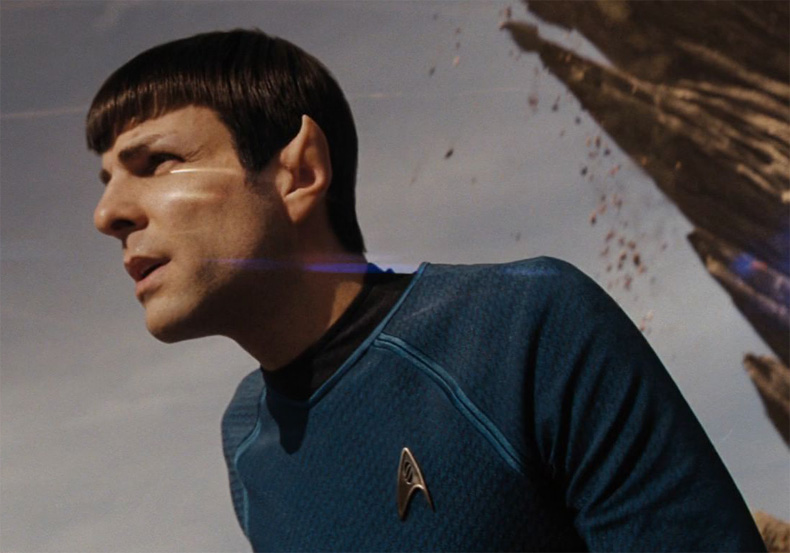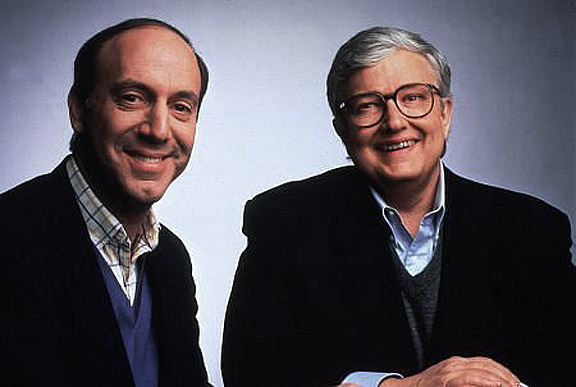In J.J. Abrams’ reboot of the “Star Trek” universe, Spock is a burdened soul. As in Gene Roddenberry’s original series, he is the only child of a human mother and Vulcan father — by birth, a man of two worlds and an outcast. But Abrams and his co-writers give him a fascinating additional burden: Midway through the first movie, Spock’s home planet of Vulcan is destroyed by a Romulan villain, Nero. The enormous implosion claims the lives of the planet’s indigenous population as well as Spock’s mother. Cosmic and personal tragedies converge: not only does Spock lose his mom — his heretofore beacon of humanity — he and his Vulcan kinsmen become stateless nomads. Even at his most vulnerable, though, Spock controls his emotions, and lets logic dictate his actions, declaring his race to be an endangered species.
The destruction of Vulcan, one of the most crucial planets in the “Star Trek” legendarium, should be at the core of J.J. Abrams’ films. It is the single development that most distinguishes the original TV and movie series from Abrams’ reboot, an event so boldly imagined that it marks the filmmakers’ new, blank canvas with a hideous dark stain. And yet for the most part, the new films draw around the stain, not treating it quite as an afterthought, but not engaging with it as fully as they ought to.
I believe they should engage with it — that in fact they should put it at the heart of the new franchise. It has an imaginative power comparable to the destruction of Alderaan in “Star Wars, Episode IV: A New Hope,” which gave 1970s children apocalyptic nightmares, though not intentionally: “Star Wars” creator George Lucas treated the Death Star’s annihilation of a world as the cause of space-nausea and never mentioned it again, much less weighed down the adopted Alderaanian Leia Organa with the psychological freight of its absence.
In contrast, Abrams and his collaborators have woven mentions of Vulcan’s death into the plot of the second film, “Star Trek Into Darkness,” in ways that, however tossed-off and limited, reinforce the superiority of “Star Trek” to “Star Wars” as popular art; they could, and should, build these references out and embellish them, because they’re solid enough to give the entire franchise an a narrative anchor that it thus far has lacked.
“As if millions of voices cried out in terror…”

What makes “Star Trek” more than an enormous digital tchotchke made entirely of space junk is how grounded it is human, or sentient humanoid, reality. In this universe, actions have consequences. The survivors of wars, extermination campaigns, famines and other dark events carry the psychological aftershocks around for years or generations; the trauma becomes a part of who they are as individuals, as well as a part of galactic history. Talk about diverging timelines: this one bold, perhaps reckless plot improvisation, annihilating Vulcan, calls for a page-one rewrite of the whole Roddenberry-inspired mythos. Imagine if France or Japan were destroyed by a madman and its displaced citizens were left without a home, or a focal point for their cultural memories. That’s what the citizens of the Federation must have experienced after the death of Vulcan. It is an event that must have changed everything, as we humans have said of our real-world knowledge of mass death and destruction and other cataclysmic historical events. The extermination of Vulcan brings new, true meaning to a phrase affixed, however fleetingly, to the destruction of Alderaan in the “A New Hope”: “…a great disturbance in the Force, as if millions of voices suddenly cried out in terror, and were suddenly silenced.” A horror of such magnitude would hang over peoples’ thoughts even if they weren’t Vulcan, or had never met a Vulcan.
That present-tense experience of grief is palpable even though the new “Star Trek” series hasn’t placed it at the heart of its stories. Why not formalize the focus, and see what results? I believe the new “Star Trek” franchise would be a greater, more powerful, more moving accomplishment if it stopped obsessing over the maturation of the impetuous James T. Kirk — an amusing but too-familiar arc, one that many adventure series have already portrayed — and redirected its energy toward exploring the psychology of the post-Vulcan Mr. Spock, the rightful lead in this rebooted franchise. That Abrams seems already to be headed in that direction, however fitfully, suggests that on some level he has already accepted this truth, although he hasn’t yet embraced it as enthusiastically as I believe he should.
At the end of “The Wrath of Khan,” the second film in the original “Star Trek” series, Captain Kirk eulogizes Spock by declaring, “Of all the souls I have encountered in my travels, his was the most human.”
This anthropocentrism has always been evident in “Star Trek,” and, even though it betrays a superficially Earth-bound and reactionary nature, the statement echoes the deeper, secular, Bertrand Russell-style humanism of “Star Trek.” As such, the “human soul” of Spock that Kirk laments is that of a universal adherent of the Golden Rule. This maxim has always governed Spock, whose strict dedication to Aristotelian logic was, for all intents and purposes, a gimmick. Given the choice, the character always opted for doing the Right Thing, even if it led to self-sacrifice.
In the reboot universe, J.J. Abrams could have amplified these central tenets of the character. With their planet gone, Spock and the remaining Vulcans are left without a home. “Star Trek” has built up this race as wise and philosophical, a people whose existence is based around knowledge, around reading and thinking and remembering. The total obliteration of the Vulcans’ home planet is the razing of the Great Library of Alexandria, the Fall of Babylon, the Sack of Rome and the incineration of Hiroshima and Nagasaki, all rolled into one.
How would a catastrophe this immense affect the Federation? Are there tenets of the Vulcan culture that are irredeemably lost in time? What sort of effect does this have in the Federation’s balance of power?
On Mr. Spock and survivor’s guilt
There is a more immediate analogue, too, namely the destruction of Vulcan as the “Star Trek” equivalent of the Holocaust. The event turns the Vulcan race into an intergalactic Jewish diaspora consisting entirely of survivors.

The mere fact of their existence would be so notable that any surviving Vulcan, Spock included, would find himself burdened with a kind of perverse and hard-to-process celebrity, unwanted because of its tragic nature, but also useful for getting things done – for advancing within one’s profession, be it Starfleet or Federation government, education or science or the arts. A survivor of Vulcan would be a person that most thinking, feeling people would want to speak with, commiserate with, perhaps even fete. For all we know, Spock might have already been the recipient of so many sympathy-based honorary degrees and medals that he tosses new ones in a designated drawer and never looks at them again, knowing on some level that they’re mainly just congratulating him for being alive and salving collective guilt over what happened to Vulcan. He might be a man who, no matter what else was happening in his life, always had other things on his mind, things so terrible that he could barely stand to contemplate them. “Star Trek Into Darkness” already hints at this. In the cockpit of the shuttle, Spock tells his colleague and lover Uhura that it isn’t that he can’t feel emotion, but that he chooses not to. This isn’t wholly a Vulcan cultural peculiarity. It’s also related to the destruction of Spock’s home world, the mother planet whose death also claimed his blood mother.
This is powerful stuff, and potentially fruitful. Abrams’ “Trek” films have been criticized for shifting the original series’ focus away from exploration and onto political and military intrigue, but this needn’t necessarily represent a betrayal of what the original stood for. The destruction of Vulcan could let Abrams formalize an interest that’s already evident to anyone who’s seen “Star Trek” and “Star Trek Into Darkness,” and let the new series look at many of the classic “Star Trek” philosophical and moral issues through a fresh prism.
Among the questions such a refocused series could explore: Who preserves the memory of Vulcan? Would a new, post-Vulcan society of Vulcan survivors have fascist overtones, defending the racially “pure” against the unwanted attentions of the mixed-blood portion of society? Perhaps the surviving Vulcans have split into political factions akin to those seen within so many majority-minority societies. They may also be squabbling about how best to relate to the “majority” society they’ve been forced to become a part of; their arguments could echo the ones that happened within Native American and African-American society in the 1960s and ’70s, which were torn between trying to change the United States’ majority culture to make it more hospitable, versus standing apart from it or actively attacking it. The aftershocks of Vulcan’s end also raise the question of whether a civilization can be a proper civilization without a homeland, or a home world. That there’s a fleeting reference in “Star Trek Into Darkness” to New Vulcan — presumably this universe’s Vulcan version of Israel? — suggests that Abrams and his cowriters have already been thinking about it.
It’s all quite fraught — a powderkeg of identity politics that people would avoid at cocktail parties for fear of ruining the evening. Where would Spock, a racially “impure” Vulcan, find himself in all of this? He would probably be an assimilationist, committed to integrating Vulcan identity into the patchwork of galactic civilization, otherwise why would he have committed himself to Starfleet, or the Federation itself? This commitment would already be present given what we know about Spock’s “half-breed” psychology, but the destruction of Vulcan would magnify those feelings and give his actions even greater urgency.
But not every Vulcan would agree with Spock. There would probably be separatist elements, perhaps with a militant mentality. Some would have dedicated themselves to wiping out the Romulans as revenge for Vulcan’s death, notwithstanding counter-arguments that Nero, the man responsible for Vulcan’s destruction, was just a “bad apple,” not representative of the Romulans as a race. And of course the Vulcans that wanted revenge against the Romulans wouldn’t call it “revenge.” They’d come up with some “logical” euphemism. But that would be their true motivation, and it’s something Spock would have to contend with in his role as a half-Vulcan Starfleet officer, a man who’s under constant pressure to be A Credit to his Race.
Mr. Spock, your destiny is calling

There is a further point to consider in the Abrams universe: in the original series, Kirk and Spock’s friendship is formed over time. Moments before he dies, Spock tells Kirk that he is, and always shall be, Kirk’s friend. When the two start their professional relationship, this future familial bond is a mystery to them. In the reboot universe, however, the writing’s already on the wall. The older Spock flat out tells his younger alt-reality self that he and Kirk will eventually be best friends.
Isn’t it plausible that by giving his younger self information that he would otherwise not be privy to, old Spock actually changes the future? We know that the universe of “Star Trek” has a relativist approach to time, not determinist. By implying a future friendship, could the old Spock be actually affecting — perhaps even dooming — that bond? Heisenberg’s uncertainty principal would suggest so. How would Spock, now the true hero of “Star Trek,” deal with such a dilemma?
This line of argument also suggests a more fundamental difference between classic “Trek” and the reboot. In the original version, destiny does not play a part. The ship is called Enterprise, and is the vessel to uncover hitherto unknown possibilities. The reboot errs strictly on the side of destiny. The crew of the Enterprise is destined to be together; Kirk and Spock are destined to be best friends; the Enterprise is destined to encounter Khan. But if all these conceits, previously established in the original Trek universe, are destined to happen, how, then, would they be affected by the destruction of Vulcan? And how would Spock, as the real hero of this incarnation of “Star Trek,” surmount these personal, philosophical, and physical challenges?
These are logical questions with potentially fascinating answers.
Ali Arikan is the chief film critic of Dipnot TV, a Turkish news portal and iPad magazine, and one of Roger Ebert’s Far-Flung Correspondents. Ali is also a regular contributor toThe House Next Door, Slant Magazine’s official blog. Occasionally, he updates his personal blog Cerebral Mastication. In addition, his writing appears on various film and pop-culture sites on the blogosphere. He also believes in the transformative potential of Twitter.












